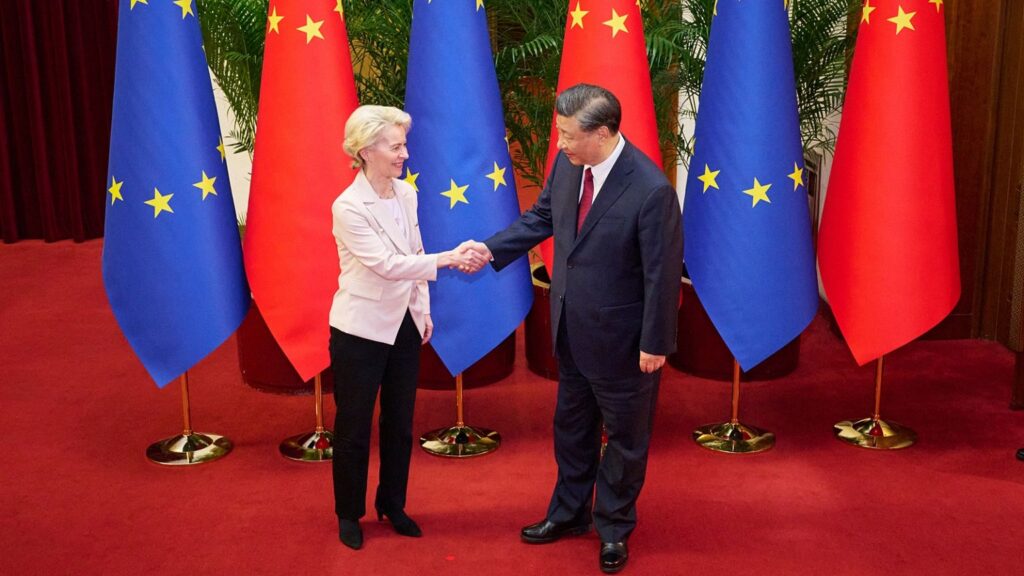While the United States’ aggressive tariff strategies continue to dominate global trade headlines, a quieter but increasingly tense economic confrontation is unfolding between China and the European Union — one that could have lasting implications for global markets, supply chains, and industrial policy.
Behind the scenes, tit-for-tat measures between Brussels and Beijing have intensified in recent months, exposing a fractured relationship marred by accusations of unfair trade practices, overcapacity, and geopolitical divergence.
The European Union recently restricted Chinese companies from participating in public tenders for medical devices, citing concerns over procurement transparency and national security. China quickly retaliated by imposing import curbs on European medical products, marking a fresh escalation in the long-simmering standoff.
Simultaneously, China made good on its long-threatened tariffs on EU-made brandy, a move widely interpreted as a retaliatory response to the EU’s 2024 imposition of anti-subsidy duties on Chinese electric vehicles (EVs).
Both sides have since ramped up their criticism and countermeasures, with diplomatic language growing sharper and economic cooperation increasingly fraught.
“EU-China trade relations are now quite poor,” said Marc Julienne, director of the Center of Asian Studies at the French Institute of International Relations (Ifri), speaking to CNBC earlier this week. “What was once a domain of great opportunity and enthusiasm has now become more about managing risk.”
This sentiment is echoed across European policy circles. Grzegorz Stec, a senior analyst at the Mercator Institute for China Studies, noted that the two economies are increasingly on a collision course, especially on issues like industrial policy, trade diversion, and market access.
“Beijing’s increasingly urgent need to export contradicts the EU’s desire to protect its own industrial base,” Stec said, referencing China’s ongoing struggle with overcapacity and sluggish domestic demand. These structural issues have compelled Chinese exporters to look outward, often at prices and volumes that European officials say distort competition and threaten homegrown industries.
Beijing’s recent tariffs on European brandy are being described by analysts as “economic weaponization” — part of a broader strategy to pressure Brussels into scaling back scrutiny and protectionist measures. The Chinese investigation into European spirits began shortly after the EU initiated its own probe into Chinese EV subsidies.
This pattern of retaliatory trade policy is not new in global geopolitics, but the stakes are growing. Europe’s trade deficit with China continues to widen, and concerns are mounting over the environment for foreign firms in China, which many say has become increasingly restrictive and opaque.
Interestingly, some experts argue that U.S. tariffs under President Donald Trump could have served as a catalyst for closer EU-China cooperation. Instead, both parties have grown more entrenched in their respective trade positions.
“If anything, the EU and China should have used the U.S. pressure as a common ground for negotiation,” Julienne said. “But instead, geopolitical divergence and mutual distrust prevailed.”
Jean-Marc Fenet, senior fellow at the ESSEC Institute for Geopolitics & Business, believes part of the reason is that China feels it has already ‘won’ its tariff standoff with Washington, reducing the urgency to compromise with Brussels.
“Beijing no longer sees the need for a unified front with the EU,” Fenet said. “In fact, there’s growing concern in Beijing that the EU may fall in line with Washington’s harder stance on China.”
The China-U.S. trade framework agreement announced in June — covering contentious areas such as rare earth exports and technology regulations — only reinforced that perception. Earlier this year, Beijing had already moved to restrict exports of critical rare earth elements and magnets, leveraging its dominance in materials vital to the automotive, energy, and defense sectors.
With an upcoming EU-China Summit scheduled for July 24 in Beijing, hopes are low for a breakthrough. Sources confirm that European Commission President Ursula von der Leyen and Chinese President Xi Jinping are expected to meet, but even senior officials are bracing for a tense and possibly unproductive dialogue.
“The significant hardening of the European Commission’s trade stance, and the bolstering of protectionist tools in recent years, suggest more frictions ahead,” Fenet said.
Indeed, trade experts warn of a long and bumpy road for EU-China relations. As the EU pursues greater economic autonomy and retools industrial policy to protect key sectors, Beijing is unlikely to ease its assertive stance, particularly as it looks to export its way out of structural economic stagnation.
“The overcapacity issues, paired with China’s use of rare earths as leverage in EV tariff talks, suggest that this trade conflict has only just begun,” said Stec.
The brewing tension between two of the world’s largest economies — the EU (GDP $19 trillion) and China (GDP $17.5 trillion) — threatens to disrupt multiple industries, from luxury goods and automobiles to healthcare and green technology.
Companies operating across both markets may face regulatory uncertainty, new tariffs, and a rising compliance burden. Investor sentiment may also sour, particularly in sectors heavily reliant on EU-China trade flows.
As of July 11, European stock markets remain volatile, with the Euro Stoxx 50 down 0.8% over the past week. Chinese markets, meanwhile, have been weighed down by weak domestic data and trade anxiety, with the Shanghai Composite dipping 1.2% this week.

